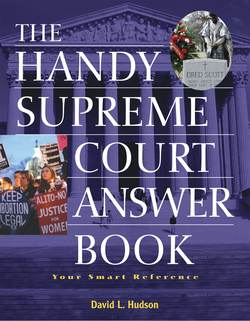Читать книгу The Handy Supreme Court Answer Book - David L Hudson - Страница 73
На сайте Литреса книга снята с продажи.
If the majority opinion becomes the law of the land, are concurring and dissenting opinions important?
ОглавлениеYes, concurring and even dissenting opinions can be important. Sometimes, the law will develop such that a concurring opinion will actually become the guidepost for future decisions in the area. A classic example was Justice John Marshall Harlan’s concurring opinion in the Fourth Amendment case Katz v. United States (1967). While Justice Potter Stewart wrote the Court’s majority opinion, Harlan’s concurring opinion and “reasonable expectation of privacy” test has become the opinion relied on by the majority of lower courts.
Types of Opinions
U nanimous opinion: An opinion in which all justices vote with the majority.
Majority opinion: This opinion, which must have five votes, is the ruling of the Court. It stands as precedent for future cases.
Plurality opinion: The main opinion of the Court but one that fails to command a majority of the justices. For instance, a case may have four justices agreeing with one opinion, two justices who file concurring opinions but not joining the other four, and three justices in dissent. In this 4–2–3 split, there is no majority opinion.
Concurring opinion: An opinion that agrees with the result but not the reasoning of the majority or main opinion of the Court. A justice who writes a concurring opinion may want to emphasize particular points of law or simply indicate that the main opinion reached the right result by taking the wrong path.
Dissenting opinion: An opinion that disagrees with the result of the majority opinion.
Per curiam opinion: An opinion rendered by the Court, or a majority of the Court, collectively instead of a single justice.
Similarly, dissenting opinions can be important, particularly if the U.S. Supreme Court overrules itself in a particular area of the law. A classic example of a dissenting opinion that became the law of the land was Justice Hugo Black’s dissenting opinion in the Sixth Amendment right to counsel case of Betts v. Brady (1942). The majority in Betts ruled that state courts did not have to provide an attorney to all indigent defendants charged with felonies in non-death penalty cases. However, the Court overruled that decision twenty-one years later in Gideon v. Wainwright (1963) and, in a remarkable irony, Justice Black had the honor of writing the unanimous opinion for the Court, taking the same position that he took in dissent in Betts.
